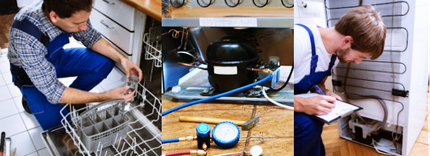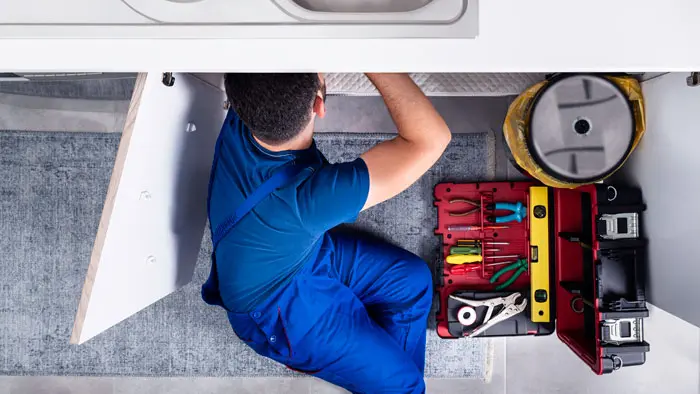Essential Safety Rules for DIY Repairs – Dependable Refrigeration & Appliance Repair Service Dryer repair near me
Essential Safety Rules for DIY Repairs – Dependable Refrigeration & Appliance Repair Service Dryer repair near me
Blog Article
The Ultimate Overview to Understanding Appliance Fixing in your home
When your fridge stops cooling or your oven refuses to warm, it can really feel overwhelming. Understanding appliance repair at home can conserve you time and money. You'll discover to acknowledge signs and symptoms, utilize necessary tools, and follow an organized troubleshooting process. Prior to you start, there are essential security preventative measures you need to take right into account. What are one of the most usual troubles, and exactly how can you repair them? Let's discover the essentials.
Typical Device Issues and Their Signs and symptoms
When your home appliances start breaking down, it's crucial to acknowledge the indications beforehand. Overlooking them can cause larger problems and costly repairs. If your fridge isn't cooling properly, you might notice warm spots or condensation forming. This can show a failing compressor or an obstructed vent.Your dish washer might reveal problems through unclean meals or unusual sounds throughout cycles. If you hear grinding or clanking, it's time to investigate.A washing device that won't rotate or drain pipes can leave you with soaked washing, recommending a clogged up drainpipe or a malfunctioning pump.Lastly, if your stove's temperature seems off or it takes forever to pre-heat, you might be managing a faulty thermostat. By remaining alert to these signs and symptoms, you can attend to issues prior to they rise into major repairs.
Important Devices for Device Fixing
When you're dealing with home appliance repairs in your home, having the right tools is crucial. Fundamental hand devices like screwdrivers and pliers will certainly help you dismantle and repair numerous devices, while electrical testing gadgets assure you're functioning securely with circuitry. Allow's review what you require to begin on your repair service journey.
Basic Hand Tools
Having the right tools is necessary for efficient home appliance fixing at home. Beginning with a trustworthy screwdriver collection, consisting of both flathead and Phillips types, as screws prevail in device assembly. Pliers are also essential; they aid with gripping, turning, and reducing wires or tiny components. A set of needle-nose pliers can get to limited areas quickly. You'll require a good flexible wrench for tightening up or loosening nuts and screws. An utility blade is helpful for cutting via packaging or insulation. Don't fail to remember a sturdy workbench or surface to securely organize your tools and parts. With these standard hand tools, you'll be well-prepared to take on most device repair services that come your way.
Electric Testing Gadgets
Along with basic hand tools, electrical screening devices play an essential function in appliance fixing. These tools aid you identify electric problems and guarantee devices function safely. A multimeter is vital; it gauges voltage, current, and resistance, enabling you to determine problems rapidly. A non-contact voltage tester is an additional essential, allowing you identify real-time cords without making straight get in touch with, enhancing your security. Clamp meters are fantastic for measuring existing flow in cords without detaching them, conserving you time and effort. Furthermore, circuit testers can swiftly check if outlets are operating appropriately. By making use of these devices, you'll streamline your troubleshooting process and improve your repair work skills, making home appliance maintenance a whole lot less complicated.
Step-by-Step Overview to Diagnosing Device Issues
When your device acts up, it can be frustrating, but detecting the concern doesn't need to be frustrating. You'll find out to recognize common troubles and use reliable repairing methods. Let's walk with the steps to get your device back in functioning order.
Typical Home Appliance Problems

Fixing Techniques Discussed

Repairing Major Kitchen Devices: A Closer Look
Have you ever questioned how to take on usual problems with your cooking area appliances? Fixing significant kitchen area devices like fridges, stoves, and dish washers can be much easier than you assume. Begin by determining the issue-- whether it's a fridge not cooling or a stove that won't heat up. Frequently, a straightforward reset or inspecting the power resource can address the issue.For fridges, tidy the condenser coils and examine the door seals. If your oven's not heating, check the heating aspect and thermostat. Dishwashers may simply require a tidy filter or a reset to get them back in action. Always unplug the home appliance before diving right into repairs to ensure your safety.Don' t fail to remember to speak with the individual handbook for certain repairing pointers connected to your design. With a little bit of persistence and the right tools, you can with confidence tackle device fixings and conserve money in the process!

Fixing Laundry Appliances: Tips and Techniques
When your washing home appliances start breaking down, it can really feel overwhelming, but troubleshooting them doesn't need to be a headache. Start by checking the power supply. Confirm the home appliance is plugged in and the electrical outlet is operating. Next, check the door or cover switch; a damaged button can avoid the equipment from operating.For washers, if it's not rotating, check for unbalanced lots. Rearranging the garments could solve the issue. If your dryer isn't heating, clean the dust filter and inspect the air vent for blockages.Listen for uncommon noises; they can indicate a problem. If your appliance is leaking, check the hoses for cracks or loose connections. Record any type of error codes displayed on electronic displays, as they can lead you in identifying the concern. Get in touch with the customer manual for details fixing suggestions connected to your model.
Security Preventative Measures to Take Throughout Repair works
Before you begin any device repairs, it's necessary to focus on security to stop accidents or injuries. Unplug the device or turn off the circuit breaker to ensure no power reaches it while you work. Use shielded devices to minimize the danger of electrical shock. Put on security goggles and gloves to secure on your own from sharp sides or debris (Dependable Refrigeration & Appliance Repair Service Dryer repair near me).Make particular your office is tidy and well-lit, so you can see what you're doing. Keep kids and pet dogs away from the area to prevent interruptions and possible hazards. If you're managing gas devices, be additional cautious; look for leakages prior to proceeding.Take your time, and don't rush via repair work. If you feel uncertain about any type of step, it's far better to stop and research than to guess. Complying with these safety measures will certainly help produce a much safer atmosphere for your DIY appliance repair work job
When to Call a Specialist for Help
How do you know if it's time to hire a specialist for appliance repairs? If you've tried basic troubleshooting without success, it's a clear indicator. As an example, if your home appliance still won't start or reveals unusual noises after resetting it, do not hesitate to look for expert help.When you see leaks, smoke, or shedding smells, prioritize security and call a pro right away. These issues can cause more substantial damages or position threats to your home.Also, if your home appliance is under guarantee, contacting a specialist is frequently the most effective path. They can ensure that repair services will not nullify your warranty, saving you cash in the long run.Finally, if you're uncertain or unpleasant with intricate repairs, it's smart to leave it to the professionals. Remember, dealing with challenging concerns without the appropriate competence can lead to expensive mistakes. Trust fund a professional when unsure!
Often Asked Concerns
Just How Can I Avoid Home Appliance Problems in the Future?
To stop device issues in the future, you must perform routine maintenance, look for deterioration, tidy filters, and prevent overloading. Staying proactive will assist expand their lifespan and keep them running smoothly.
What Are the A Lot Of Common Do It Yourself Appliance Repair Work Mistakes?
You may overlook safety and security precautions, avoid repairing steps, or utilize incorrect devices when trying DIY home appliance repairs. Hurrying the procedure or disregarding supplier standards can result in even more considerable issues and costly blunders. Keep patient and educated!
Just how Do I Know if a Part Needs Replacement?
You can inform if a part needs replacement by looking for uncommon noises, leakages, or inconsistent performance. If the here home appliance has a hard time to run properly or reveals visible damage, it's most likely time for a replacement.
Can I Utilize Generic Components for Appliance Repair Works?
Yes, you can use generic parts for home appliance fixings, yet establish they work - Kenmore Dryer Repair Oro Valley Dependable Refrigeration & Appliance Repair Service. Generic parts might save you cash, yet they could influence efficiency or durability, so evaluate your choices thoroughly before making a choice
What Warranties Cover Device Repair Works?
The majority of home appliance warranties cover fixings for producing defects, yet they commonly exclude damage from abuse. Inspect your warranty terms carefully, as some could require using qualified service technicians and original components for coverage to remain legitimate.
Report this page